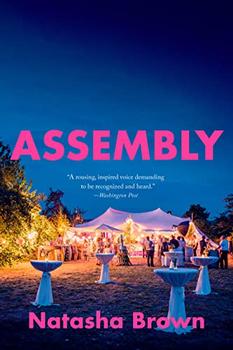Summary | Excerpt | Reviews | Beyond the Book | Read-Alikes | Genres & Themes | Author Bio

Critics' Opinion:
Readers' Opinion:
First Published:
Sep 2021, 112 pages
Paperback:
Sep 2022, 112 pages
 Book Reviewed by:
Book Reviewed by:
Valerie Morales
Buy This Book
This article relates to Assembly
Psychologists Pauline Clance and Suzanne Imes first identified "imposter phenomenon," popularly known as "imposter syndrome," in 1978. It is characterized by a belief that one's success is accidental. Clance and Imes' research was based on high achieving women who couldn't accept the success they had created and were frightened others would find out they were frauds. Marginalized people can be especially vulnerable to imposter syndrome. Natasha Brown powerfully demonstrates the phenomenon in her debut novel Assembly. The narrator, a British Jamaican woman working in finance in London, questions herself and her success.
Argentine American journalist Marina Peña has published a powerful essay about her imposter syndrome as an immigrant. She recalls how it began after she received a scholarship to attend a private school in L.A. when she was 13 years old: "I quickly started to doubt myself. I felt like an outsider. I wondered whether I was even smart enough to be there, whether I could handle the academic rigor. Whether receiving the scholarship had all just been a fluke. I mean, after all, in my mind, I was just an immigrant kid from Argentina who read one too many Harry Potter books. No matter what I did, I couldn't shake those feelings of not being worthy enough to be in my own school. I assumed that the day would come when a teacher or the principal would tell me 'Marina, I'm sorry but we made a mistake. We're going to have to rescind your scholarship.'"
Racial imposter syndrome is characterized by feelings of doubt when one's internal identity doesn't match others' perception of them due to their race. In Assembly, the narrator's white colleagues imply she comes from Africa because of her skin color, while in truth, her background is Jamaican. The narrator is often second-guessed and belittled in this way, and she eventually wants to give up.
In an essay from her book Bad Feminist, Roxane Gay, a Black Haitian American woman, recounts hearing one of her graduate school peers talk about her presence on campus, saying she was only there because of affirmative action. Hurt by the othering, Gay sobbed in a private office and then wondered if perhaps they were right. Maybe she wasn't equal to everyone else. Gay writes, "I made sure my comprehensive exams were solid. I wrote conference proposals & had them accepted. I published. I designed an overly ambitious research project for my dissertation that kind of made me want to die. No matter what I did, I heard that girl, that girl who had accomplished a fraction of a fraction of what I had, telling a group of our peers I was the one who did not deserve to be in our program."
In Assembly, the world doesn't see the narrator — who discovers she has cancer — as a patient, or as vulnerable, or as exhausted and anxious, but rather as a diversity hire, someone taking away a white man's job. The messages that she doesn't belong are rampant and aren't limited to her workplace but exist in a variety of public spaces, even at the country house of her boyfriend's parents.
Dr. Valerie Young, author of The Secret Thoughts of Successful Women: Why Capable People Suffer from Imposter Syndrome offers advice for those dealing with the experience: "A sense of belonging fosters confidence. If you're the only or one of a few people in a meeting, classroom, field, or workplace who look or sound like you or are much older or younger, then it's only natural you'd sometimes feel like you don't totally fit in. Plus, if you're the first woman, [person] of color, or person with a disability to achieve something in your world, e.g. first VP, astronaut, judge, supervisor, firefighter, honoree, etc. there's that added pressure to represent your entire group. Instead of taking your self-doubt as a sign of your ineptness, recognize that it might be a normal response to being on the receiving end of social stereotypes about competence and intelligence."
Peña managed her anxiety as a news producer for Yahoo! Finance by talking to other women of color for support. She came up with a ritual in which she would say to herself: "You're awesome, you've got all this talent, use it. You got this!"
Filed under Society and Politics
![]() This "beyond the book article" relates to Assembly. It originally ran in October 2021 and has been updated for the
September 2022 paperback edition.
Go to magazine.
This "beyond the book article" relates to Assembly. It originally ran in October 2021 and has been updated for the
September 2022 paperback edition.
Go to magazine.





The House on Biscayne Bay
by Chanel Cleeton
As death stalks a gothic mansion in Miami, the lives of two women intertwine as the past and present collide.

The Flower Sisters
by Michelle Collins Anderson
From the new Fannie Flagg of the Ozarks, a richly-woven story of family, forgiveness, and reinvention.

The Funeral Cryer by Wenyan Lu
Debut novelist Wenyan Lu brings us this witty yet profound story about one woman's midlife reawakening in contemporary rural China.
Your guide toexceptional books
BookBrowse seeks out and recommends the best in contemporary fiction and nonfiction—books that not only engage and entertain but also deepen our understanding of ourselves and the world around us.